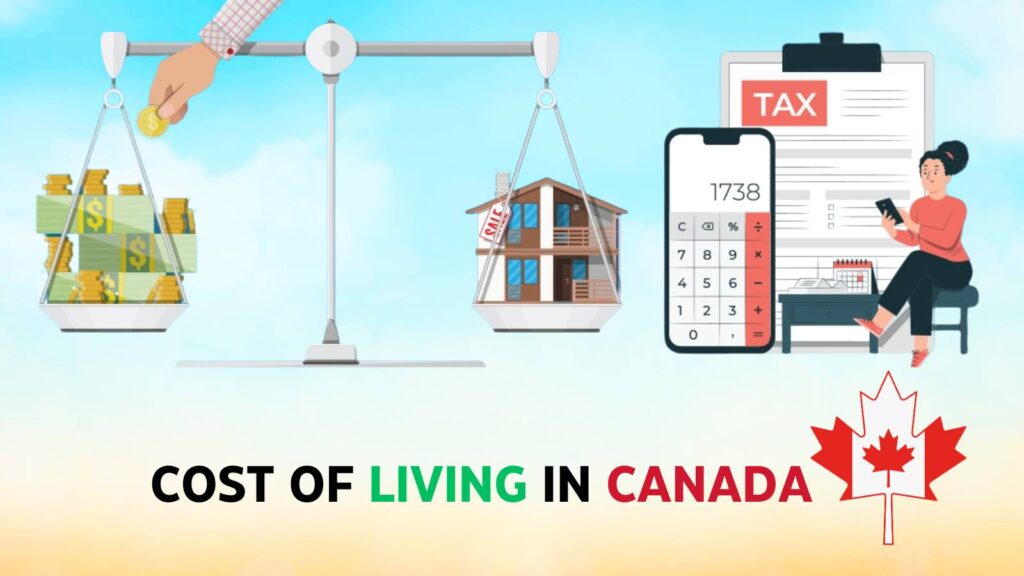Moving to Canada can be an exciting journey, Arriving as a new immigrant or an international student. One of the most important aspects to understand before settling in is the cost of living in Canada. From housing and transportation to food and healthcare, every expense varies based on the province and city you choose.
Understanding these factors not only helps in financial planning but also ensures a smoother transition and a more comfortable lifestyle.
Monthly Living Costs Overview for Newcomers and Students
The average monthly cost of living in Canada largely depends on your lifestyle, city of residence, and whether you are a student or a working immigrant. On average, a student may need around CAD 1,000 to CAD 2,000 per month, excluding tuition fees. New immigrants, especially families, should budget between CAD 2,500 to CAD 4,000 monthly. These figures include essential costs such as rent, food, transportation, and utilities. It’s important to consider that costs in major cities like Toronto and Vancouver are significantly higher compared to smaller cities like Halifax or Winnipeg.
Canada Living Costs: Student & Immigrant Survival Guide
1. Housing and Rent Costs in Major Canadian Cities
Housing is typically the largest monthly expense for anyone living in Canada. Rent prices vary significantly by location. For example, renting a one-bedroom apartment in downtown Toronto can cost between CAD 2,000 to CAD 2,500 per month. In contrast, a similar apartment in Halifax may only cost around CAD 1,200.
Students often have the option of staying in on-campus dormitories, which are relatively more affordable and convenient. Prices for dorms range from CAD 500 to CAD 1,200 depending on the university and location. Off-campus housing, including shared apartments or homestays, can cost between CAD 600 to CAD 1,500 monthly.
New immigrants typically look for rental apartments or houses. Shared accommodations can significantly reduce housing costs, particularly in expensive cities. It’s advisable to visit suburban areas where rent is generally lower than in city centers.
2. Utilities and Internet Expenses
Utilities include electricity, heating, water, and garbage collection. For a standard apartment, monthly utility costs range between CAD 100 to CAD 250, depending on the season and location. In colder provinces, heating bills can spike during winter months.
High-speed internet in Canada costs about CAD 50 to CAD 100 per month, with options for bundled packages that include cable TV and home phone services. Mobile phone plans typically start at CAD 30 and can go up to CAD 100, depending on data usage and coverage.
3. Food and Grocery Costs
Food expenses vary depending on eating habits, dietary preferences, and whether one cooks at home or dines out. On average, an individual spends between CAD 200 to CAD 400 per month on groceries. Shopping at budget-friendly stores like No Frills, Walmart, or FreshCo can help save money.
Dining out in Canada is relatively expensive. A basic meal at an inexpensive restaurant costs around CAD 15 to CAD 20, while a three-course meal for two at a mid-range restaurant can range from CAD 60 to CAD 100. Students and immigrants can significantly reduce food expenses by preparing meals at home and taking advantage of weekly deals and coupons.
4. Transportation Costs in Canada
Transportation costs depend on the city and mode of transport. Most urban centers have reliable public transportation systems, including buses, subways, and trams. A monthly transit pass typically costs CAD 80 to CAD 160. Students often benefit from discounted passes.
Owning a car involves additional expenses such as insurance, fuel, maintenance, and parking. Car insurance alone can cost between CAD 100 to CAD 300 per month depending on driving history, location, and type of vehicle. Gasoline prices range from CAD 1.50 to CAD 2.00 per liter.
Ride-sharing apps like Uber and Lyft are available in major cities and are convenient alternatives to owning a vehicle, although they can be costly for daily commuting.
5. Health Insurance and Medical Expenses
Healthcare in Canada is mostly public-funded, but coverage varies by province. Permanent residents are generally eligible for provincial health insurance plans, which cover basic medical services.
International students are required to have health insurance, which may be provided by the institution or purchased privately. Costs range from CAD 600 to CAD 1,000 per year. Some services like dental care, vision care, and prescription medications may not be covered and will incur out-of-pocket expenses.
6. Education and Tuition Fees (For Students)
International students in Canada pay tuition fees ranging from CAD 15,000 to CAD 35,000 per year depending on the program and institution. In addition to tuition, students need to budget for books, supplies, and other academic-related expenses, which can total CAD 500 to CAD 1,000 per semester.
Scholarships, bursaries, and part-time job opportunities can help offset these costs. It’s important for students to research financial aid options available at their chosen institution.
7. Personal and Entertainment Expenses
Personal expenses include items like clothing, toiletries, and personal care. On average, a monthly budget of CAD 100 to CAD 200 is sufficient. Entertainment costs such as movie tickets (around CAD 15), dining out, streaming subscriptions, and outings can add another CAD 100 to CAD 300 depending on individual preferences.
Students and newcomers can enjoy free events, student discounts, and local community programs to enjoy social life without overspending.
8. Provincial Comparison of Cost of Living
The cost of living in Canada differs widely across provinces. Ontario and British Columbia are among the most expensive provinces, particularly in cities like Toronto and Vancouver. On the other hand, provinces such as Manitoba, Saskatchewan, and New Brunswick offer more affordable living options.
For example, while rent in Vancouver can exceed CAD 2,500 for a one-bedroom apartment, in Winnipeg or Moncton, similar housing might cost just around CAD 1,000. Utility and transportation costs also tend to be lower in smaller cities.
Tips to Manage Expenses in Canada
Managing your expenses effectively is crucial for living comfortably in Canada, especially if you are a student, new immigrant, or working professional trying to settle in. Below are some practical and detailed tips to help you stay financially balanced in a high-cost country like Canada.
1. Create a Monthly Budget
Start by noting your income and fixed expenses such as rent, utilities, insurance, and subscriptions. Use budgeting tools and apps like Mint, You Need a Budget (YNAB), or even simple spreadsheets to categorize your spending.
Review your budget every month to adjust for changes in income or new expenses. Tracking every dollar helps you avoid overspending and prioritize saving goals such as building an emergency fund or repaying loans.
2. Use Student Discounts
If you’re a student, make the most of your valid student ID or ISIC card. Many services across Canada offer discounts to students—this includes public transport (like the TTC in Toronto), museums, software subscriptions (like Microsoft and Adobe), food chains, clothing stores, gyms, and even mobile phone plans.
You can also join student discount programs like SPC (Student Price Card) or UNiDAYS for additional exclusive deals. Always ask if a student discount is available—many places don’t advertise it openly.
3. Shop Smart for Groceries and Essentials
Before heading to the store, check weekly flyers from chains like Walmart, Loblaws, No Frills, or FreshCo to compare prices. Use apps like Flipp, Reebee, or Checkout 51 to find deals and cashback offers.
Sign up for loyalty programs such as PC Optimum or Air Miles to earn rewards on everyday purchases. Buying in bulk, choosing store-brand items, and shopping at discount grocery stores like Dollarama or Costco (if you have a membership) can also help you save a lot in the long run.
4. Live with Roommates
Housing is one of the largest expenses in Canada, especially in major cities like Toronto, Vancouver, and Montreal. Sharing an apartment or house with roommates can significantly reduce your monthly rent and utility bills.
Beyond saving money, living with others can also offer social support, especially for newcomers. Just be sure to set clear agreements on shared expenses and responsibilities to avoid misunderstandings.
5. Cook at Home
Dining out or ordering food through delivery apps can quickly add up, often costing 2–3 times more than a home-cooked meal. Plan your weekly meals, buy ingredients in bulk, and cook in batches to save both time and money.
Investing in basic kitchen appliances like a rice cooker, air fryer, or slow cooker can make cooking easier and more efficient. Not only is cooking at home budget-friendly, but it also allows you to eat healthier and tailor meals to your taste.
6. Plan Transportation Wisely
Public transportation in Canada is reliable in urban centers and more affordable than owning a car. Choose accommodation that’s close to a subway, bus, or streetcar route to reduce commuting time and costs.
A student, take advantage of discounted transit passes offered by universities and transit authorities. For longer distances, consider carpooling with apps like Poparide or using intercity bus services like Megabus or FlixBus, which often have low-cost options when booked early.
FAQs
1. How much does it cost to live in Canada per month?
The average monthly cost of living in Canada varies by city and lifestyle. For a single person, it typically ranges from CAD $1,500 to $3,000, including rent, groceries, transportation, and other basic expenses. Larger cities like Toronto and Vancouver are more expensive, while smaller cities like Halifax or Winnipeg are more affordable.
2. What is the average rent in major Canadian cities?
Rent can vary widely depending on location:
- Toronto: $1,800–$2,500/month for a 1-bedroom
- Vancouver: $1,900–$2,600/month
- Montreal: $1,200–$1,800/month
Shared accommodations or renting with roommates can reduce costs significantly.
3. How much should international students budget for monthly expenses?
International students should budget around CAD $1,000 to $2,000 per month, excluding tuition fees. This includes housing, groceries, transportation, phone bills, and entertainment. Living on-campus or with roommates can help reduce costs.
4. Is healthcare free in Canada for newcomers?
Public healthcare is free for Canadian citizens and permanent residents. New immigrants may have a waiting period (up to 3 months) in some provinces. It’s advised to purchase private health insurance during this time. International students typically need to pay for a university-provided health plan.
5. What is the cheapest city to live in Canada?
Some of the more affordable cities include:
- Winnipeg, Manitoba
- Quebec City, Quebec
- Moncton, New Brunswick
- Halifax, Nova Scotia
These cities offer lower rents, cheaper groceries, and affordable transportation compared to major metros.
6. Are groceries expensive in Canada?
Groceries are moderately priced but can vary by region. A single person might spend CAD $200–$400/month on groceries. Shopping at discount stores (like No Frills or Walmart), using flyers and coupons, and buying in bulk can help reduce expenses.
7. How expensive is public transportation in Canada?
Public transport is affordable and reliable in most cities. Monthly transit passes typically cost:
- Toronto (TTC): Around $156
- Vancouver (TransLink): $102–$189 depending on zones
- Montreal (STM): About $94
Students usually get discounted passes through their institutions.
8. Is it cheaper to own a car or use public transport?
For most newcomers and students, public transport is more cost-effective. Owning a car involves expenses like insurance, gas, maintenance, and parking, which can add up to $500–$800 per month or more.
9. How much does internet and mobile service cost?
Canada has some of the highest mobile and internet costs globally. Expect to pay:
- Mobile plans: $40–$70/month (with limited data)
- Home internet: $60–$100/month
Student or newcomer plans may offer discounts—always compare providers before subscribing.
10. Can I work part-time as a student to manage living expenses?
Yes. International students can work up to 20 hours per week off-campus during academic sessions and full-time during breaks. Many students work part-time in retail, food service, or campus jobs to help cover their living expenses.






